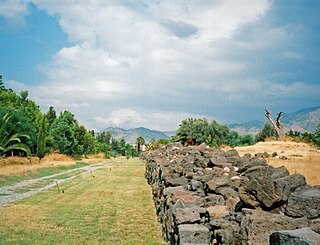Diodorus Siculus was a 1st-century BC Greek historian who wrote the Bibliotheca historica.
Diodorus may also refer to:
Didymus may refer to:
Apollodorus was a popular name in ancient Greece. It is the masculine gender of a noun compounded from Apollo, the deity, and doron, "gift"; that is, "Gift of Apollo." It may refer to:
Pyrrhus, Pyrrhos or Pyrros (Πύρρος) may refer to:

Diodorus Siculus or Diodorus of Sicily was an ancient Greek historian. He is known for writing the monumental universal history Bibliotheca historica, in forty books, fifteen of which survive intact, between 60 and 30 BC. The history is arranged in three parts. The first covers mythic history up to the destruction of Troy, arranged geographically, describing regions around the world from Egypt, India and Arabia to Europe. The second covers the time from the Trojan War to the death of Alexander the Great. The third covers the period to about 60 BC. Bibliotheca, meaning 'library', acknowledges that he was drawing on the work of many other authors.

Demetrius is the Latinized form of the Ancient Greek male given name Dēmḗtrios (Δημήτριος), meaning “Demetris” - "devoted to goddess Demeter". Alternate forms include Demetrios, Dimitrios, Dimitris, Dmytro, Dimitri, Dimitrie, Dimitar, Dumitru, Demitri, Dhimitër, and Dimitrije, in addition to other forms descended from it. Nicknames include Demmie, Dimmie, Demi, Jim, Jimmy, Jimmie, Metry, Metrie, Mimmie, Demetri, Dimitri, Mitică and Dima.
Heraclides, Heracleides or Herakleides in origin was any individual of the legendary clan of the Heracleidae, the mythological patronymic applying to persons descended from Hercules. As they were of the legendary tribe of the Dorians, the name in the classical age could mean anyone of Dorian background. The Dorians had their own group of dialects, which may or may not have been spoken by given individuals. Usage of the name was concentrated at Syracuse, a Dorian colony, Tarentum, a Spartan colony, and central Greece, legendary ancestral homeland of the Dorians, but they colonized the islands, Crete, and Anatolia as well. As a personal name, Heraclides may refer to:
The name Dionysius was common in classical and post-classical times. Etymologically it is a nominalized adjective formed with a -ios suffix from the stem Dionys- of the name of the Greek god, Dionysus, parallel to Apollon-ios from Apollon, with meanings of Dionysos' and Apollo's, etc. The exact beliefs attendant on the original assignment of such names remain unknown.
Apollonius is a masculine given name which may refer to:
Maximus is the Latin term for "greatest" or "largest". In this connection it may refer to:
Asclepiades is the name of:
Caranus may refer to:

Naxos or Naxus was an ancient Greek city of Magna Graecia, presently situated in modern Giardini Naxos near Taormina on the east coast of Sicily.
Bibliotheca may refer to:

Diodoros or Diodorus Greek: Διόδωρος; born Damianos G. Karivalis Greek: Δαμιανός Γ. Καρίβαλης was the Patriarch of Jerusalem in the Eastern Orthodox Patriarchate of Jerusalem from 1980 to 2000.
Ariston may refer to:
Modestus was a Roman cognomen. It may refer to:
Theodoros or Theodorus is a masculine given name, from which Theodore is derived. The feminine version is Theodora. It may refer to:
Demetrius may be a given name.
This article lists people, events and other subjects which are referred to as "of Alexandria".
Diophantus, born Herais, was an intersex person who lived in the second century BC and fought as a soldier with Alexander Balas. His life is known from the works of Diodorus Siculus.